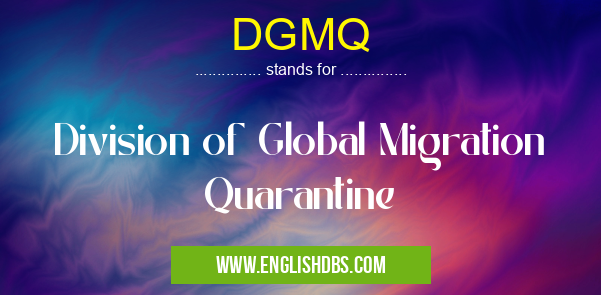What does DGMQ mean in UNCLASSIFIED
DGMQ stands for “Division of Global Migration and Quarantine”. It is a division of the Centers for Disease Control and Prevention (CDC) that works with the United States Immigration and Customs Enforcement (ICE) to ensure travelers entering the US are healthy and free from communicable diseases. DGMQ works closely with other federal, state, local, tribal, and international health departments to implement preventative measures for potential disease outbreaks.

DGMQ meaning in Unclassified in Miscellaneous
DGMQ mostly used in an acronym Unclassified in Category Miscellaneous that means Division of Global Migration Quarantine
Shorthand: DGMQ,
Full Form: Division of Global Migration Quarantine
For more information of "Division of Global Migration Quarantine", see the section below.
Essential Questions and Answers on Division of Global Migration Quarantine in "MISCELLANEOUS»UNFILED"
What is the Division of Global Migration Quarantine?
The Division of Global Migration Quarantine (DGMQ) is a division within the United States Centers for Disease Control and Prevention (CDC). This division is responsible for identifying, preventing, and responding to public health threats related to the global migration of people and animals. DGMQ works with other divisions within CDC, government agencies, and international partners to protect the public from global health threats.
What services does DGMQ provide?
The mission of DGMQ is to identify, prevent, and respond to public health threats that arise due to the global migration of people and animals through surveillance, disease investigation, communication activities, capacity building initiatives, data analysis, emergency response planning and training activities.
How does DGMQ work with other divisions within the CDC?
DGMQ works collaboratively with the other six divisions in CDC’s National Center for Emerging and Zoonotic Infectious Diseases (NCEZID) on specific projects such as providing technical expertise on communicable diseases that can travel around the world due to globalization; working together on policies regarding travel-related infections; supporting pandemic preparedness initiatives; developing partnership surveys assessing public health risks among specific populations; collaborating with international partners; leading various research studies; providing support for multinational outbreak responses.
How does DGMQ work with other governmental agencies?
DGMQ maintains strong partnerships with organizations like Customs & Border Protection (CBP), Homeland Security Investigations (HSI), Immigration & Customs Enforcement (ICE), Department of State, Coast Guard International Health Regulations Branch Office (IHRB), Department of Agriculture (USDA) Animal Health Programs, Domestic Nuclear Detection Office (DNDO), Department Of Defense Science Directorate’s Bird Flu Program as well as those in other countries in order to provide efficient screening protocols related to infectious diseases among travelers or imported animals from abroad.
What types of research do you conduct?
The Division conducts research related to emerging infectious diseases that may be spread by people move rapidly around the world. This includes significant investments in novel diagnostics and treatments for antibiotic resistant organisms or vector-borne diseases like malaria or dengue fever. Research also focuses on developing vaccines against diseases lacking effective countermeasures which can also pose a risk when spread across continents by travelers. In addition we investigate social science issues that affect migrant populations including those at risk for human trafficking or exploitation due to their migratory status.
Does DGMQ have any collaboration agreements with outside parties?
Yes! To further our public health mission we collaborate widely with government agencies, non-governmental organizations in both domestic an international environments along all points in a voyage from origin point through final destination country where a traveler may find themselves exposed new germs from different parts of world - this include questions surrounding how vulnerable communities are adapting their coping mechanisms when dealing with potential exposure risk due healthcare accessibility disparities impacting already vulnerable poputation.
Do you respond to emergencies?
Yes! During emergencies - whether it's natural disasters or epidemics - DGMQ quickly mobilizes resources & personnel needed ensure safety while containing outbreak during times crises which require swift response time & deployment teams who're capable swiftly identifying & responding fast moving problem pathogens before they become widepread regionally globally.
Does your work involve addressing human rights issues related to global migrations?
Yes! Public health is intertwined wih human rights which means concerns respecting protecting populations from infectious disease outbreaks must always be balanced against need upholding basic human dignity ensuring migrants are respected treated fairly regardless cultural background religious beliefs etcenforce international standards recognizing importance preserving dignified life all humans when traveling internationally.
Final Words:
The Division of Global Migration and Quarantine provides an important service in ensuring travelers have not contracted communicable diseases before entering the US borders. This helps protect both those already in our country as well as those who arrive here each day desiring safe passage into our nation. By conducting assessments on all incoming persons this specialized agency is able to minimize public health risks brought about through migration while still allowing eligible persons access into our country under careful consideration of both current pandemic risk levels an individual case evaluations when necessary.
